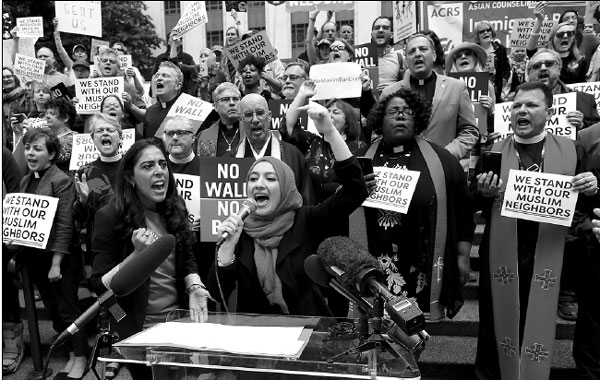Top court upholds Trump travel ban
17 states sue administration over family separation policy
WASHINGTON - With the US Supreme Court handing President Donald Trump a judicial victory on Tuesday by upholding a travel ban on seven countries, observers pondered his next move on the immigration front.
The five-to-four ruling, with conservative justices in the majority and liberal justices dissenting, ended a legal battle over whether the policy amounted to an unlawful restriction of Muslims as it confirmed broad presidential powers over immigration and national security policy.
Five of the countries in the ban - Iran, Libya, Somalia, Syria and Yemen - have Muslim-majority populations. The ban also affects travelers from the Democratic People's Republic of Korea, and some Venezuelan government officials and their families.
A sixth majority-Muslim country, Chad, was removed from the list in April after improving "its identity-management and information sharing practices", Trump said then.
"Immigrant rights advocates said the travel-ban ruling is bound to fortify Trump's conviction to accelerate the administration's efforts to choke off legal avenues for refugees, foreign students and temporary workers, all of whom have been confronted with new hurdles for entry," David Nakamura wrote in The Washington Post.
Roy Beck, president of NumbersUSA, a group that seeks reduced immigration, said the advocates' strategy was to try to delay Trump in court, a tactic his own group has used to defeat "amnesty" proposals for undocumented immigrants.
"But today is maybe emblematic of what's coming down the line," Beck said. "We may be able to expect to see more actually happening."
Trump hailed Tuesday's ruling as "a moment of profound vindication" following "months of hysterical commentary from the media and Democratic politicians who refuse to do what it takes to secure our border and our country".
Lower courts had blocked the travel ban, announced in September, as well as two prior versions, in challenges brought by Hawaii and others. The Supreme Court had allowed the ban to go largely into effect in December while the challenges continued.
The court held on Tuesday that the challengers had failed to show that the travel ban violated either immigration law or the Constitution's First Amendment prohibition on the government favoring one religion over another.
The ruling affirmed broad presidential discretion over who is allowed to enter the US. Trump could potentially add more countries to the ban.
"Under the court's Trump-specific analysis, just about any official indignity that unduly burdens the lives of minorities or marginalized groups within our borders may well be tolerated," Cristian Farias wrote on the New York magazine website.
The challengers had argued that the policy was motivated by enmity toward Muslims and urged courts to take into account Trump's comments during the 2016 presidential campaign. Trump as a candidate called for "a total and complete shutdown of Muslims entering the United States".
"This decision will someday serve as a marker of shame," said Democratic Representative Keith Ellison of Minnesota, the first Muslim elected to the US Congress.
Controversy on border
The ruling empowered Trump at a time when he faces controversy over his approach toward illegal immigration along the US-Mexico border. Trump last week retreated on his administration's practice of separating the children of immigrants from their parents when families were detained entering the US illegally.
Washington State Attorney General Bob Ferguson formally filed a multistate lawsuit on Tuesday against Trump's "family separation" policy.
The legal action led by Ferguson and brought to the US District Court for the Western District of Washington was joined by a coalition comprising the District of Columbia and 17 states, including California, Delaware, Illinois, Iowa, Massachusetts, Maryland, Minnesota, New Jersey, New Mexico, New York, North Carolina, Oregon, Pennsylvania, Rhode Island, Virginia, Vermont and Washington.
Tuesday's lawsuit said until Trump signed the executive order, his zero-tolerance policy "had resulted in the separation of over two thousand children from their parents at the Southwestern border, most recently at a rate of 50-70 families separated every day.
"This unlawful practice exacerbates the trauma already suffered by refugee families while simultaneously artificially increasing illegal entry violations," the complaint read.
Reuters, AP and Xinhua contributed to this story.
|
Varisha Khan from the group OneAmerica speaks to a crowd in reaction to the US Supreme Court ruling upholding the travel ban on Tuesday, in Seattle, Washington state.Karen Ducey / Getty Images Via Agence Francepresse |
(China Daily 06/28/2018 page11)















